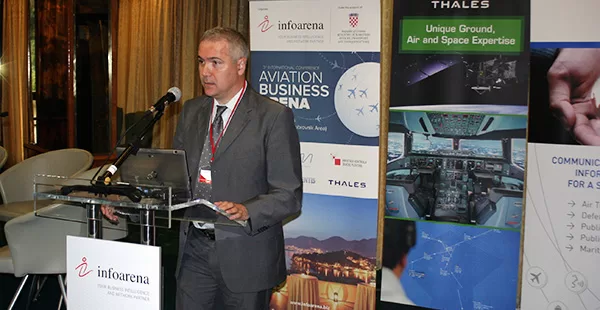The 3rd Aviation Business Arena 2014 entitled “Key Issues and Major Policy Challenges” gathered from 28 to 30 May at the Croatia Hotel in Cavtat around a hundred Croatian and international experts who discussed on the EU aviation policy, strategic challenges for airports in Central and South-eastern Europe, development, consolidation and the perspective of airlines’ business models.
The conference was organised by Infoarena Group, with the Croatian Civil Aviation Agency (CCAA) and Croatia Control Ltd (CCL) as co-organisers, and on behalf of the sponsor it was opened by Siniša Hajdaš Dončić, Minister of Maritime Affairs, Transport and Infrastructure.
‘The Croatian aviation industry, including airports, airlines, air navigation services and the CCAA, has been challenged with the adjustment to new trends in the context of increasing aircraft size, airport capacities and passenger expectations, said Minister in his keynote speech, placing emphasis on safety as the highest-priority requirement, and added that he was proud of CCL and CCAA as leaders in the region. ‘Croatia as a state should follow that path, since a single Croatian kuna invested in air traffic generates four to five times greater effect on economy in total’, concluded Minister.
The preceding welcome speeches were delivered by Tomislav Gavazzi, Founder and Owner of the Infoarena Group, Darko Prebežac, Professor of Air Traffic and Tourism Marketing Management at the Faculty of Economics and Business in Zagreb, Dragan Bilać, CCL’s Director General and Jeffrey Goh, Member of the Star Alliance Management Board.
Dragan Bilać said that the Single European Sky lays obligations on all EU member states and ANSPs, which are required to achieve a high performance level in four key performance areas: safety, capacity, environment and cost-efficiency. Within the context of CCL’s performance, he stressed that less delays were recorded in 2013 than the year before, with the same level of traffic and increased efficiency. He added that CCL has been preparing for the RP2 2015 – 2019, when it must achieve outstanding results in all four KPAs in order to sustain its competitive advantage.
For the European Union air traffic represents a very significant sector, which participates in the creation of 5.1 million jobs, contributing to 2.4% of European GDP and, despite the increasingly frequent economic crisis, is expected to grow about 5% annually by 2030. More than 150 airlines, a network of over 400 airports and 60 air navigation service providers have power that is recognized across the EU economy so that attention is paid to the EU common aviation policy.

At one of the round tables, entitled “Single European Sky – Political, Economical and Technological Issues and Challenges in the Region”, the following issues were discussed:
- Solutions/answers to the challenges that the industry is facing in safety, capacity, environment protection and cost efficiency – Single European Sky initiatives (SES, SES II, SES II+).
- How to balance between four key performance areas?
- To what extent are that initiatives successful in air traffic management?
- How far we have reached in terms of defragmentation of European airspace, timely performance, increase of safety standards, flying efficiency, reducing the negative impact of air traffic on the environment?
- SESAR – current status: what are technological achievements by now and what are the future technologies that will assure the Single European Sky?
- Positive and negative effects for ANSPs and for European states regarding the SES implementation?
The introductory speech to the panel was delivered by Frank Brenner, Eurocontrol’s Director General, it was moderated by Andrew Charlton, Managing Director Aviation Advocacy, and the panel members were: Patrick Bernard (EC), Dragan Bilać (CCL’s Director General), Frank Brenner, Morten Dambaek (Chief Executive Officer, Naviair, Denmark), Thomas Hoffmann (Member of the Management Board and Chief Operating Officer, AustroControl) and Luc Lallouette (SESAR Programme Director, Thales Air Systems).
At the end of the first day, Director General Dragan Bilać organised a visit of Frank Brenner and Jeffrey Goh to the Dubrovnik ATC Centre, which was hosted by Hrvoje Skokandić, Head of the Centre. They were accompanied by CCL management and Darko Prebežac, President of the Supervisory Board.
